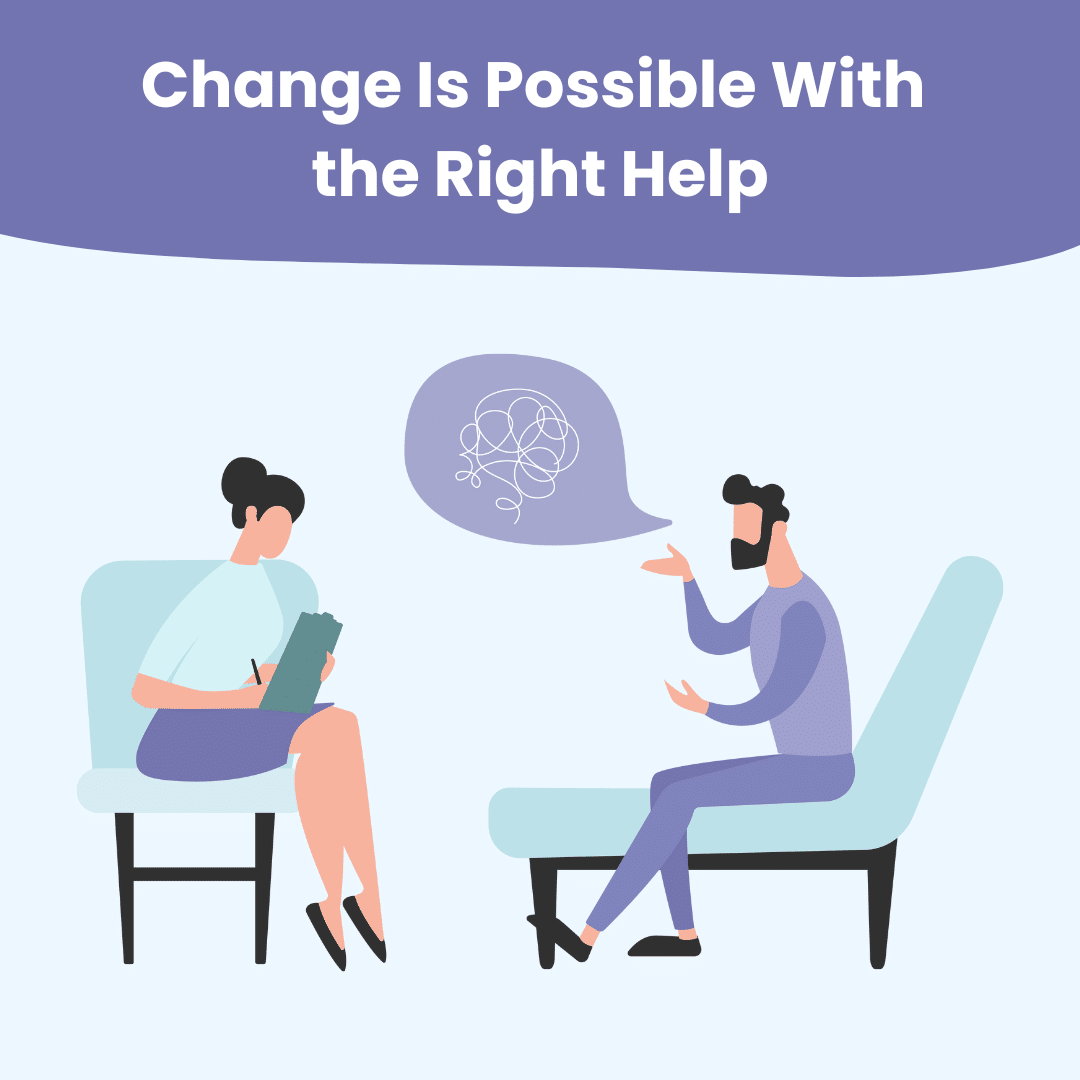
- Updated on 1 July 2024
Tags: grief, bereavement, mourning, therapy
While grieving, it can feel like our pain will last forever. You might wonder, does grief ever go away? When and how does grief end? Unfortunately, there are no simple answers as grief is both complex and personal. So then how do we cope with grief? How does grief change over time? What are some self-care tips for coping with grief?
Loss is part-and-parcel of life. We all experience it at some point. Grieving is a natural response to this loss. In fact, coping with the loss of a loved one is one of the most challenging experiences we face in life.
In the moment, grief can feel insurmountable. However, the feelings of loss generally diminish over time. It is important to remember that everyone has their own timeline for grieving. Moreover, we all cope and react to grief in our own way. Another person’s grief can appear different from your own. But both your expression of grief and theirs are valid.

What Is Normal Grieving?
Normal grief is a completely natural psychological response to the loss of a loved one. When bereavement first occurs, we commonly experience what is termed as “normal grief” or “acute grief”. This phase usually occurs within a few weeks to 6 months (Boelen & Smid, 2017).
Normal grief is stereotypically understood as having feelings of sadness and yearning for the deceased (Shear, 2012). However, it is good to note that just like how there are many triggers for grief, there are also multiple dimensions to grieving.
Some ways in which normal grieving can occur are (Lally & Valentine-French, 2019; Mughal, Azhar & Siddiqui, 2021):
Emotional
- Emptiness
- Anger
- Guilt
- Helplessness
- Disbelief
- Shock
- Irritable
Mental
- Difficulty focusing on tasks
- Recurrent thoughts of the deceased (eg memories resurfacing)
Psychological
- Feeling hostile
- Restlessness
- Low moods
Physical
- Falling ill
- Feeling fatigued
- Tearful
- Bouts of nausea
- Shortness of breath
- Headaches
- Tension in the body
- Muscle weakness
- Upset stomach
- Sleeping very little or sleeping more than usual
- Eating very little or eating more than usual
Social
- Withdrawing from social activities or participating more than usual
While extensive, this list of grief reactions is not exhaustive. You may experience other reactions to grief that are not listed here. The grief reactions that may seem more unique to you are still valid.
Most importantly, during this difficult period, we need to monitor our own well-being. This involves becoming aware of how grieving is affecting us and seeking support when needed, such as seeking medical attention for physical symptoms. Also, it can mean speaking to our loved ones or a therapist about the emotional, psychological, and mental struggles.
What Are the Stages of Grief?
One popular (but incomplete – more on this later) way in which grief has been conceptualized is in Kübler-Ross’s Five Stages of Grief (1969). Originally, this model was created based on a study about individuals reacting to news on having a fatal diagnosis. However, overtime, the use of this model has been applied to other experiences of grief. This includes bereaved individuals (Stroebe, Schut & Boerner, 2017).
Each stage of grief was theorized to be experienced sequentially. This categorization was intended to provide more tailored support for individuals in each different stage. The five stages are (Kübler-Ross, 1969; Lally & Valentine-French, 2019):
Denial
- The first emotional reaction to unexpected news.
- This can be a conscious or unconscious decision to deny that a diagnosis is true. In addition, it can also be denying that the diagnosis has an impact oneself and that one is aware of the diagnosis.
Anger
- A physical or emotion reaction with the intention of faulting someone. It allows one to have a temporary sense of control.
Bargaining
- Attempts to negotiate about and postpone the situation. It creates a sense of distance from the situation.
Depression
- Feeling sad and helpless.
Acceptance
- A more stable state where one learns to integrate the news about impending death and carry on living.
Why the 5 Stages of Grief May Be Limited
The Kübler-Ross’s Five Stages of Grief is widely applied. However, it is limited in helping us better understand grief. Here are some reasons why this model may not be an accurate representation of the grieving process (Stroebe, Schut & Boerner, 2017):
- Individuals who are terminally-ill do not grieve similarly to bereaved individuals.
- The categorisation of grief into five sequential stages is too prescriptive and often inaccurate. Strictly following the model can place undue expectations on bereaved individuals on how they should be grieving.
- Moreover, the experience of grief can be incredibly complex. Naturally, bereaved individuals grieve in their own unique ways that are not accounted for in this model.
- Not to mention that cultural differences and environmental factors (eg social support) of a bereaved individual will also change the grieving process for them. In essence, bereaved individuals can experience emotional reactions that fluctuate across time.
Kübler-Ross’s Five Stages of Grief is unable account for individual differences in grieving. Mental health practitioners are generally not advised to use it. You may find that your experience of grieving is not accurately captured in this model. This is a normal occurrence and not a cause for concern. The way in which you process grief and move through the grieving process is unique to you.
Myths & Facts About Grief
Myth: Grief follows a specific, linear progression of stages.
Fact: While there are five stages of grief, it doesn’t necessarily follow this exact sequence. Everyone grieves differently, and these stages may happen in any order, overlap, or even be skipped entirely.
Myth: It’s necessary to “stay strong” in the face of loss.
Fact: Feeling the need to put on a brave face often hinders the grieving process. It’s okay, and indeed healthy, to express and share feelings of sadness, anger, or confusion that come with grief.
Myth: If you grieve correctly, you should be “over it” within a year.
Fact: There’s no set timeline for grief. Everyone copes with loss in their own time and in their own way. Grief can ebb and flow and can be triggered by specific dates, events, or reminders even years after the loss.
Myth: Crying is a necessary part of the grief process.
Fact: Crying is a common response to sorrow, but it’s not the only way to express grief. Some people may not cry at all but still experience deep feelings of loss.

Other Models of Grief
There are more accurate models of grief that have been proposed in place of Kübler-Ross’s Five Stages of Grief. One such model is the Dual-process Model of Grieving (Stroebe & Schut, 1999). This model proposes that bereaved individuals move back and forth between grieving the loss and preparing for life without the deceased. Both processes facilitate normal grieving.
It also suggests that both confrontation and avoidance of loss are adaptive parts of the grieving process. The back and forth momentum continues until bereavement is completed.
Over the whole grieving process, a person’s relationship with the deceased changes form (U.S. Department of Veterans Affairs, 2021). This can be an adaptive way of coping with loss. It involves the concept of continuing bonds, where bereaved individuals retain their connection to the deceased individual and acknowledge the impact that the latter had on their lives.
It allows bereaved individuals to recognise their loss while not being debilitated by it (The Professional People Development, 2020). This can look like “talking” to a deceased individual at their grave. While the deceased is no longer around, bereaved individuals can still tap into memories about their presence.
What Does Grief Do to Your Body?
Grief can harm our physical body. Since grief is a stress reaction, it can have debilitating impact on our health (U.S. Department of Veterans Affairs, 2021). Due to the changes in stress hormones, bereaved individuals can experience a weakened immunity. This can lead to some of the physical effects of grieving as listed above. Also, grief has been found to result in worse overall health for the bereaved (Romm, 2014). It can aggravate physical pain, increase blood pressure and blood clots. Furthermore, grief can place an individual at a higher risk of having a heart attack.
When we are aware of what grief does to our body, it reminds us to nourish our body with quality care. This includes being more aware of our physiological changes while grieving. It can mean going for more regular health check-ups and consulting a doctor about difficult physical symptoms.

How Long Does Grief Last After a Death?
The duration of grieving will naturally differ for each individual. There is generally no standard “normal” timeframe in which a person is expected to grieve. The grieving process is very personal and based on many individual factors.
Some studies have attempted to provide a rough gauge for how long bereaved individuals experience more intense grief reactions. A study showed that grief reactions generally peaked around 2 to 4 months (Prigerson & Maciejewski, 2018). This includes emotions such as sadness, yearning and anger. The reactions gradually declined over a course of 2 years. Also, over this period, acceptance of loss gradually increased.
While these studies may aim to provide some understanding of the grieving process, yours is unique to you. Generally, it is important for us monitor how we are reacting to grief. This will provide information on how we are coping. If you are worried about the duration of your grief, you can consult a mental health professional. The professional will be able to provide individual assessment and address your doubts based on your situation.
How Long is Too Long Grieving?
There is no formal standard for how long an individual will grieve. There is also no short answer to the question when and how does grief end? The truth is, it really depends on each individual.
When we determine an individual is grieving for “too long”, it is in relation to an individual’s ability to cope. Clinically, this involves assessing if an individual is functioning well in different areas of life. These areas include one’s ability to run errands, continue to work and have a social life. When intense reactions to grief cause distress in one’s daily functioning and last beyond 6 months, it signals a problem. This can be a sign of complicated grief.
Complicated Grief
Complicated grief is defined as a condition where the bereaved remains distressed and unable to move towards acceptance (Shear, 2012). Generally speaking, grief does not usually require clinical treatment. However, for instances of complicated grief, mental health professionals are required to intervene. This is usually in the form of psychotherapy and/or peer support groups.
In the DSM-5, complicated grief is diagnosed as Persistent Complex Bereavement-Related Disorder. The symptoms of this disorder are (American Psychiatric Association, 2013):
- Consistent deep yearning or longing for deceased
- Feelings of loneliness, emptiness, and meaninglessness of life surface often
- Recurring thoughts that it is not fair, meaningless or difficulty in living or recurring desire to die to join the deceased
- Frequent overwhelming thoughts about the deceased (eg intrusive thoughts or images)
Generally speaking, Persistent Complex Bereavement-Related Disorder is diagnosed when one has been bereaved for at least six months. Also, symptoms of disorder above have persisted for a duration longer than the norm in one’s social group and culture. In addition, at least two symptoms of acute grief have been present for at least a month. An important aspect is that the symptoms have caused the bereaved significant distress and impairs their daily functioning.
If you believe that you might be suffering from complicated grief, it is important to seek appropriate treatment. You can seek out counselling services or consult a clinic for assistance.
Factors Affecting the Duration of Grieving
There are some factors that have been theorized to affect the duration of grieving. While these factors have been researched on, it is important to remember that grieving is deeply personal. The effect of factors can differ for each individual. Some factors which have been explored are (Milic, Muka, Ikram, Franco & Tiemeier, 2017):
Relationship with the deceased (eg spouse, child, parent, grandparent)
- When one is the spouse of the deceased, there tends to be a higher severity of grief.
- In grieving, bereaved individuals tend to recall more positive memories of the decreased spouse and suppress negative memories. This causes difficulty in regulating moods and increases intensity of grief.
- When one is the parent of the decreased, there is usually more intense and prolonged grieving (Lally & Valentine-French, 2019).
- Bereaved parents tend to be unprepared for the passing of their child. They are also more likely to deteriorate in their physical and mental health.
Age of bereaved
- Bereaved individuals who are older typically manage the grieving process better.
- As people age, they tend to develop more adaptive coping strategies. When faced with challenging circumstances, these individuals are less emotional. Also, difficult emotions are better handled.
Intellectual capacity
- People who are bereaved and have the capacity to rationally process grief tend to cope better. This provides opportunities to develop strategies to manage grief though exploring deeper meaning to life and its spiritual aspects.

Grief vs Mourning
What is the difference between mourning and grieving? Sometimes we see the terms being used interchangeably. However, they have distinctly different meanings (Casarett, Kutner, & Abrahm, 2001). Grieving is an individual’s personal reaction to loss. This encompasses emotional, mental, physical, and psychological aspects as listed above.
On the other hand, mourning is about how people adapt to a loss and often, an outward expression of grief. This tends to refer more to religious and cultural traditions of coping with grief. For example, this can commonly be seen in public funerals.
There are four objectives that mourning serves. This is encapsulated in Worden’s tasks of mourning (2018):
Accept the reality of the loss
This requires both an cognitive and emotional acceptance of loss. An inability or reluctance to accept loss can cause a use of maladaptive coping.
Process the pain of the grief
- Three aspects: external, internal and spiritual
- For the external aspect, the bereaved needs to adjust to an environment without the deceased. This can include:
- Changes in social role
- Development of skills to live without the deceased
- In terms of the internal aspect, the bereaved needs to adapt to any changes in their sense of self.
- Loss can impact an individual’s identity, self-esteem and self-efficacy. The bereaved needs to determine the significance of loss with regards to their self-identity.
- Regarding the spiritual aspect, the bereaved needs to examine how life will be like moving forward.
- It can be beneficial to enlist the help of a therapist to process any anxieties in this stage.
Find a way to remember the deceased while progressing on the rest of one’s life journey
- This stage is centred around the bereaved moving on with life, while retaining positive association with the deceased.
- Continuing bonds can be constructed for the bereaved, acknowledging both the loss and the memories of the deceased.
- This creates opportunities for the bereaved to honour the deceased (eg living a life that the deceased wanted).
Process the pain of the grief
-
The bereaved may wish to seek support from loved ones or a therapist to process the difficult emotions.
The intensity of pain can vary across time but importantly pain needs to be validated, without an intention of suppressing it.
Self-Care Tips for Coping With Grief
When we are grieving, self-care can be a vital component in helping us cope. During the phase of acute grief, we can feel intense emotions and physical discomfort. Furthermore, we are often preoccupied with thoughts of the deceased. This can be an overwhelming experience to manage. It is good to treat ourselves with self-compassion and seek out support when we need. Some self-care tips for coping with grief are (HammondCare, 2021; U.S. Department of Veterans Affairs, 2021):
Take care of your physical well-being
- Maintaining a strong immune system is important, especially when you are more prone to falling ill while grieving.
- Have a healthy diet.
- Ensure that you have adequate rest and sleep. If you have trouble resting and sleeping, you may wish to consult a doctor for medical advice.
- Engage in regular physical exercise to improve mood
- Seek medical attention when you need it
- Cultivate self-care habits
- While grieving, it is important to show yourself more self-compassion. This can be in the form of self-care habits, such as treating yourself to a nice meal.
Give yourself time to reminisce about the deceased
Allow yourself time and space to think about the deceased. There is no need to suppress your thoughts or emotions. They need to be acknowledged to create opportunity for moving on.
Express your feelings for the deceased and honour them
You can convey how much the deceased meant to you through creative expression (eg writing or painting). This can assist in the processing of emotions and changes in sense of self that you face, and help you feel connected to the decreased.
Seek out social support
While grieving, we may find it helpful to speak with our loved ones. Sometimes, even their physical presence can be comforting.
You may find it beneficial to communicate with individuals who have been through similar losses and grief. There are many online grief support groups and communities you can approach for this.
Prioritise your mental and emotional health
Struggling with your mental and emotional health can be common in the grieving process
If you experience intense and overwhelming feelings of grief, post-traumatic symptoms or even depression, consult a therapist.
To allow yourself to heal from symptoms of grief, it is important for you to get the support you require. Therapists are trained professionals who will help you develop better coping mechanisms and provide space to process emotions.
Takeaway
Grief is a deeply personal and complex experience that everyone may experience at least once in their lifetime. We may grieve the loss of a loved one, a job, a relationship, or something else.
How long grief lasts is entirely unique and different for everyone. While some people may cope and move on in a few months, others may require years to cope with the emotions. However, moving on rarely means forgetting the person or experience; in reality, it refers to our ability to cope and manage emotions while we experience grief in our lives.
If you are grieving during this time, try engaging in self-care activities like journalling, writing letters, exercising, and seeking social support. Therapists can help you identify and understand your emotions while you grieve and teach you effective tools to navigate the process.

References
American Psychiatric Association. (2013). Diagnostic and statistical manual of mental disorders (5th ed.). Washington, DC: Author.
Boelen, P. A. & Smid, G. E. (2017). Disturbed grief: prolonged grief disorder and persistent complex bereavement disorder. British Medical Journal. Retrieved from https://www.bmj.com/content/357/bmj.j2016.full
Casarett, D., Kutner, J. S., & Abrahm, J. (2001). Life after Death: A Practical Approach to Grief and Bereavement. Annals of Internal Medicine, 134(3), 208
HammondCare. (2021). Bereavement: the first twelve months and beyond. Retrieved from https://www.hammond.com.au/documents/free-resources/23-bereavement-the-first-twelve-months-and-beyond/file
Kübler-Ross, E. (1969). On death and dying. New York, NY: Macmillan.
Lally, M. & Valentine-French, S. (2019). Grief, Bereavement, and Mourning. LibreTexts. Retrieved from https://socialsci.libretexts.org/Bookshelves/Human_Development/Book%3A_Lifespan_Development_-_A_Psychological_Perspective_(Lally_and_Valentine-French)/10%3A_Death_and_Dying/10.10%3A_Grief_Bereavement_and_Mourning
Milic, J., Muka, T., Ikram, M. A., Franco, O. H., & Tiemeier, H. (2017). Determinants and Predictors of Grief Severity and Persistence: The Rotterdam Study. Journal of Aging and Health, 29(8), 1288-1307. doi:10.1177/0898264317720715
Mughal, S., Azhar, Y., Siddiqui, W. J. (2021). Grief Reaction. StatPearls. Retrieved from https://www.ncbi.nlm.nih.gov/books/NBK507832/
Prigerson, H., & Maciejewski, P. (2008). Grief and acceptance as opposite sides of the same coin: Setting a research agenda to study peaceful acceptance of loss. British Journal of Psychiatry, 193(6), 435-437. Retrieved from https://www.cambridge.org/core/journals/the-british-journal-of-psychiatry/article/grief-and-acceptance-as-opposite-sides-of-the-same-coin-setting-a-research-agenda-to-study-peaceful-acceptance-of-loss/F3E88293BAC745834323E0A4D25CB318
Romm, C. (2014). Understanding How Grief Weakens the Body. The Atlantic. Retrieved from https://www.theatlantic.com/health/archive/2014/09/understanding-how-grief-weakens-the-body/380006/
Shear, K. M. (2012). Grief and mourning gone awry: pathway and course of complicated grief. Dialogues Clinical Neuroscience, 14(2), 119-128. Retrieved from https://www.ncbi.nlm.nih.gov/pmc/articles/PMC3384440/
Stroebe, M. S. , & Schut, H. (1999). The Dual Process Model of coping with bereavement: Rationale and description. Death Studies, 23, 197–224. Retrieved from https://pubmed.ncbi.nlm.nih.gov/10848151/
Stroebe, M., Schut, H. & Boerner, K. (2017). Cautioning Health-Care Professionals: Bereaved Persons Are Misguided Through the Stages of Grief. Journal of Death and Dying, 74(4), 455-473. Retrieved from https://journals.sagepub.com/doi/10.1177/0030222817691870
The Professional Development People. (2020). Continuing Bonds: Building Enduring
Connections in Loss and Grief. Retrieved from https://psychology.org.au/aps/media/events/attachments/21172/continuing-bonds2020_1.pdf
U.S. Department of Veterans Affairs. (2021). Grief: Taking Care of Yourself in the Aftermath of Loss. Retrieved from https://www.cdnetwork.org/wp-content/uploads/2021/03/Grief-Self-Care-Handout.pdf
Worden, J. W. (2018). Grief counseling and grief therapy. A handbook for the mental health practitioner (5th ed.). Springer Publishing.
Related Articles
Latest Articles
Recent Posts
- A Therapist’s Guide to Setting Boundaries with Parents
- Anger Management in Singapore: Top 6 Benefits
- Individual vs Group Counselling in Singapore: What’s Right for You?
- Thinking of Switching Your Therapist in Singapore? Read This First
- How Counselling in Singapore Can Help You Overcome Dating Anxiety



